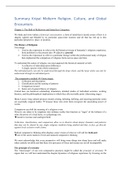Samenvatting
Summary Comparing Religions, ISBN: 9781405184588 Religion, Culture and Global Encounters
- Instelling
- Erasmus Universiteit Rotterdam (EUR)
- Boek
- Comparing Religions
Summary of CH2206 - Religion, Culture and Global Encounters Erasmus University Rotterdam
[Meer zien]





